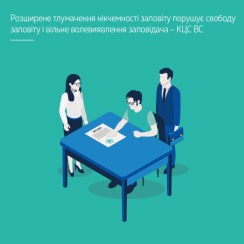Contact center of the Ukrainian Judiciary 044 207-35-46

The plaintiff asked the court to cancel the decision of the state notary's office on the refusal to issue a certificate of the right to inheritance under a will drawn up at the Embassy of Ukraine in London.
The court of first instance dismissed the claim, the court of appeal changed the reasoning part of the decision, and left its another part unchanged. The court of appeal pointed out that the testator had had chronic eye disease, which prevented him from writing and reading his will himself. This is also indicated by the content of the will, in which the testator wrote that "the will was read aloud to him, its contents are clear to him and it is written correctly from his words". The will was read aloud by the consular adviser of the embassy, instead it should have been read by another disinterested person - a witness. And therefore, since there is no information in the will that it was certified in the presence of witnesses, in accordance with part 1 of Art. 1257 of the Civil Code of Ukraine, the will is null and void as drawn up in violation of the requirements regarding its form and certification.
The Civil Cassation Court within the Supreme Court overturned the previous judgments and granted the claim making the following legal conclusions.
According to par. 3, part 2, Art. 1248 of the Civil Code of Ukraine, if the testator cannot read the will himself due to physical disabilities, the will must be certified in the presence of witnesses (Art. 1253 of this Code).
According to part 2 of Art. 1253 of the Civil Code of Ukraine in the cases established by par. 3, part 2, Art. 1248 and Art. 1252 of this Code, the presence of at least two witnesses during the certification of the will is mandatory.
Interpretation of Art. 50 of the Law of Ukraine On Notariate (as amended at the time of the disputed legal relationship) indicates that it is necessary to distinguish the appeal: 1) of a notarial action; 2) of refusal to perform a notarial action; 3) of a notarial act. Such an appeal may be implemented in case the filing of such a claim may lead to the renewal of the violated right or interest.
Taking into account the above, the Supreme Court, in particular, noted that:
The courts established that the text of the will did not contain information that the testator could not have read the will himself due to physical disabilities. In the will, the testator wrote in his own handwriting that "the will was read aloud to him, its contents are clear to him and it is written correctly from his words". In the case, there are no grounds for qualifying the will as null and void, and therefore there are no grounds for refusing to perform a notarial act.
Resolution of the Supreme Court of July 20, 2022, in case No. 461/2565/20 (proceedings No. 61-21209св21) – https://reyestr.court.gov.ua/Review/105533339.
This and other legal positions of the Supreme Court can be found in the Database of Legal Positions of the Supreme Court - lpd.court.gov.ua/login.